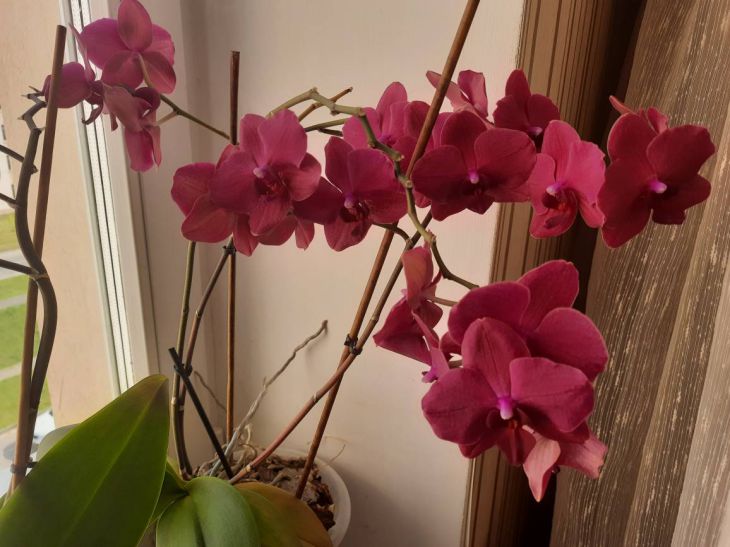Orchids are beautiful and elegant flowers that can decorate any interior.
However, they also require special care and attention, especially regarding watering.
How often and how much water should orchids be given? What water is suitable for watering?
What mistakes should be avoided when watering?
In this article, we will tell you a few little secrets that will help you water your orchids correctly and keep them healthy and beautiful.
Rule #1: Water orchids as needed, not on a schedule.
One of the most common questions that orchid lovers ask is how often these flowers need to be watered.

However, there is no single answer to this question, as the frequency of watering depends on many factors, such as the type of orchid, the size of the pot, the type of substrate, the temperature and humidity of the air, the season, etc. Therefore, it is better not to water orchids according to a strict schedule, but to rely on the plant's need for water. How to determine this need? There are several ways.
• Check the substrate moisture with your finger. If the top layer of the substrate is dry to a depth of 2-3 cm, then it is time to water the orchid. If the substrate is damp or wet, then we postpone watering until the next time.
• Look at the condition of the orchid roots. If the roots are green or light green, they are sufficiently moistened. If the roots are gray or white, they are dry and need watering.
• Weigh the orchid pot. If the pot is heavy, it is filled with water. If the pot is light, it is dry and needs watering.
Rule #2: Water your orchids generously, but don't overwater them.
Another important aspect of orchid watering is the amount of water you should give the plant.
Orchids are epiphytic plants that grow on trees in nature and feed on moisture from the air. Therefore, they do not like constant moisture in the substrate and can rot from excess water.
However, this does not mean that you need to water orchids with drops or streams.
On the contrary, orchids need abundant watering, which washes the substrate and roots and saturates them with water.
It is important that the water does not linger in the pot and flows through the drainage holes. You should also avoid flooding.
the core of the orchid's rosette of leaves, as this can lead to stem rot. How to water orchids correctly? There are several methods.
• Water orchids under the tap. This method is suitable for orchids in transparent pots with drainage holes. You need to bring the pot under a warm (not hot and not cold) tap and water the orchid so that the water washes all the substrate and roots. Then you need to let the water drain from the pot and wipe off excess moisture from the leaves and stem.
• Watering orchids in a bathtub or sink. This method is suitable for orchids in opaque pots without drainage holes. You need to lower the pot into a bathtub or sink with warm water so that the water level reaches the top of the pot. Then you need to leave the orchid in the water for 10-15 minutes so that the substrate and roots are saturated with moisture. After this, you need to take the pot out of the water and let it drain. You also need to wipe off excess moisture from the leaves and stem.
• Water the orchids with a spray or watering can. This method is suitable for orchids with shallow roots or without roots that grow on blocks of wood, bark or moss. You need to spray or water the orchid with warm water so that the block and roots are moistened. Then you need to let the water flow out of the pot and wipe off excess moisture from the leaves and stem.
Rule #3: Water your orchids with quality water, not tap water.
Another important aspect of watering orchids is the quality of the water you use to water the plants.
Orchids are very sensitive to the composition and hardness of water and can suffer from an excess or lack of minerals. Therefore, it is not recommended to water orchids with tap water, as it may contain chlorine, iron, salts and other impurities that negatively affect the growth and flowering of orchids. What water is suitable for watering orchids? There are several options.
• Rain or melt water. This is the best option for watering orchids, as this water is soft and clean. However, you need to collect rain or melt water only in clean containers and store it for no more than two weeks.
• Osmosis or distilled water. This is also a good option for watering orchids, as this water is purified from all impurities and has a neutral pH. However, it should be remembered that this water does not contain minerals that are necessary for feeding orchids. Therefore, it is necessary to periodically add special fertilizers for orchids to the water for watering.
• Boiled or filtered water. This is a compromise option for watering orchids if it is not possible to use rain, melted, osmosis or distilled water. Boiling or filtering helps reduce hardness and purify water from chlorine and other impurities. However, you need to let the water cool to room temperature before watering.
By following these rules, you will be able to water orchids correctly and provide them with optimal conditions for growth and flowering. This way, you will be able to enjoy the beauty of these amazing flowers and not worry about their health.








